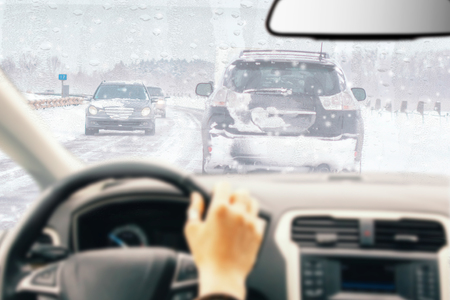Stay Calm and Ensure Safety
Your first priority after any accident, especially one involving an uninsured driver, is the safety of everyone involved. Take a deep breath and try to remain calm—it’s easy for emotions to run high, but keeping a level head will help you handle the situation more effectively. If your vehicle can be safely moved, steer it out of traffic to avoid further accidents. Turn on your hazard lights and set up flares or warning triangles if you have them. Once you’re in a secure spot, check yourself and your passengers for injuries. If anyone is hurt, call 911 right away. Even minor fender benders can cause injuries that aren’t immediately obvious, so don’t hesitate to seek medical attention if you or someone else feels unwell. Your main goal in these moments is to minimize risk and make sure everyone gets the care they need before dealing with the logistics of the accident.
2. Call the Authorities
If you find yourself in an accident with an uninsured driver, your first instinct might be to handle things privately, especially if the damage seems minor. However, it’s essential to always call 911 and report the accident, no matter how small it appears. When law enforcement arrives, they’ll create an official police report—a document that becomes invaluable down the line, particularly when the other driver lacks insurance coverage.
Police documentation does more than just record the incident; it provides a neutral third-party perspective on what happened. This can help protect your rights and interests during any insurance claims or potential legal disputes. Officers will also check if anyone needs medical attention and ensure all parties exchange information properly. Here’s a quick breakdown of why contacting authorities is so important:
| Reason to Call Police | Benefit for You |
|---|---|
| Official Accident Report | Provides unbiased documentation for insurance or legal purposes |
| Verification of Driver Details | Ensures accurate identification of all parties involved |
| Immediate Medical Assistance | Makes sure injuries are promptly treated and documented |
| Record of Uninsured Status | Confirms the other driver is uninsured for future claims or lawsuits |
No matter how minor the crash may seem, having a police report is your best defense when dealing with an uninsured driver. Skipping this step could make it much harder to recover your losses later. So, take a deep breath, dial 911, and let the professionals handle the scene—your future self will thank you.
![]()
3. Exchange and Document Information
After making sure everyone is safe and calling the police, it’s time to exchange information with the other driver—even if they don’t have insurance. In the U.S., it’s standard procedure to swap contact details at the scene of any accident. Don’t be surprised if the uninsured driver can’t provide proof of insurance; just remain calm and focus on collecting every bit of info you can. Make sure to get their full name, phone number, address, and jot down their driver’s license number. Take note of their vehicle make, model, color, and especially the license plate number. Snap plenty of photos—damage to all vehicles involved, any skid marks, road signs, and the overall scene layout. These details are crucial for your insurance claim and could help law enforcement if needed. Remember, thorough documentation is your best defense when dealing with an uninsured motorist.
4. Collect Eyewitness Accounts
When you’re involved in an accident with an uninsured driver, eyewitnesses can be a game-changer for your case. If there are bystanders or other drivers who saw what happened, take the initiative to ask for their contact information and a brief statement about what they observed. In the often-chaotic aftermath of a crash, clear and unbiased third-party accounts help establish the facts—especially when the at-fault driver doesn’t have insurance and may try to shift blame.
Why Eyewitness Testimonies Matter
Insurance companies and law enforcement rely heavily on credible witness statements to piece together accident scenarios. An eyewitness can provide details you might miss or corroborate your version of events, strengthening your claim if things get complicated legally or with your insurer.
What Information to Gather from Witnesses
| Detail | Why It’s Important |
|---|---|
| Name | Essential for follow-up by insurance or legal teams |
| Phone Number/Email | Quick contact if further clarification is needed |
| Address (optional) | Adds credibility and makes it easier to locate witnesses later |
| Written/Recorded Statement | Cements their recollection while it’s fresh, before memories fade |
Tips for Talking with Witnesses:
- Approach calmly—people are more willing to help if you’re polite.
- If possible, use your phone to record their statement (with permission) or write down what they say verbatim.
- Avoid coaching them; let them describe the incident in their own words.
- If they’re uncomfortable giving details on the spot, ask if they’d be willing to talk with your insurance company later.
The bottom line: Thoroughly collecting eyewitness accounts right after the accident adds another layer of protection for your rights and helps ensure that the facts don’t get lost in the shuffle—especially important when dealing with uninsured drivers.
5. Notify Your Insurance Company
After an accident with an uninsured driver, time is of the essence—especially when it comes to your insurance company. Report the accident as soon as possible, even if you’re still at the scene or just got home. Delaying this step can complicate your claim and may even risk denial of coverage. When you call your insurer, have all the key information handy: police report number, photos of the damage, and details about the uninsured motorist. If you carry uninsured motorist coverage—something highly recommended on American roads—this is when it really pays off. This type of coverage can help take care of repair costs for your vehicle and even medical expenses for you and your passengers. Be honest and thorough in your account; insurance companies value clear, accurate information when processing claims. Remember, the sooner you notify your insurer, the smoother and faster the claims process will likely be. Don’t hesitate to ask your agent about next steps or what documentation they need from you to keep things moving forward.
6. Consider Legal Advice
If you find yourself tangled in a complicated situation after an accident with an uninsured driver, consulting a legal professional can make all the difference. Disputes over fault, injuries, or substantial property damage are more common than you might think—especially when there’s no insurance company to help smooth things out. A seasoned attorney can walk you through your options, explain your rights under your state’s laws, and help you pursue compensation if needed. In some cases, they may recommend filing a lawsuit against the at-fault driver, or even exploring avenues like uninsured motorist coverage if your own policy includes it. Dealing with the aftermath of an accident is stressful enough; having expert legal guidance can give you peace of mind and ensure you don’t leave money on the table. If negotiations stall or you feel overwhelmed by medical bills and repair costs, don’t hesitate to reach out for professional support—it could be the smartest move you make.

